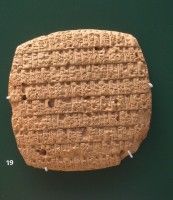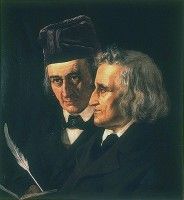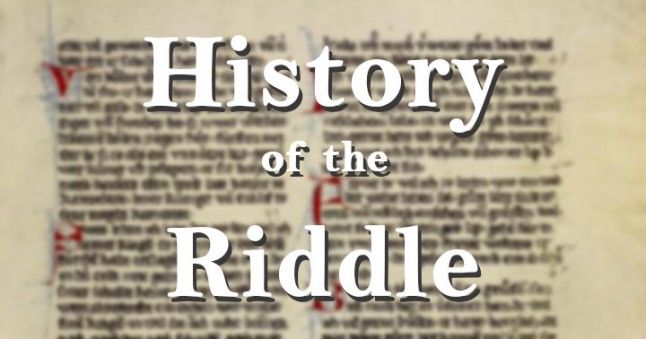Riddles – a small word that encompasses many different kinds of puzzles nowadays. But where does it come from? And for how long has mankind had it? We will look behind the history and development of the riddle from its early beginnings up to the present day.
Origin and Meaning of the Riddle
The word ‘riddle’ describes a statement or question, which directly requires a concrete answer or presents a puzzle whose hidden meaning has to be deciphered. There are two kinds of riddles. First there is the enigma – a metaphorically expressed riddle – and second there is a conundrum – a very tricky problem usually including a pun in its question or answer. An example for a conundrum would be: “What is the difference between a jeweler and a jailer?” – “One sells watches and the other watches cells.”
The word ‘riddle’ has the same origin as the word ‘read’. It is the Old English word ræ̅dan, which meant interpret or guess. Ræ̅dan also had counterparts in other Indo-European languages like German (Old Frisian riedsal, Old Saxon radisli, German Rätsel) and Dutch (Middle Dutch raetsel, Dutch raadsel). It always revolves around the same meaning of ‘to understand/ interpret the symbols’, like the old Germanic runes. From runes to modern English, the semantic field of ‘riddle’ hasn’t changed that much.
Ancient Riddles
The oldest preserved riddle is from ancient Mesopotamia. An ancient Sumerian clay tablet from Lagash (ca. 2350 BC) records the following riddle:

Another Sumerian riddle asks the answerer to name a certain institution, maybe you can guess:
“There is a house. One enters it blind and comes out seeing. What is it?”
In the Near East the riddle also spread through classic ancient Greece. The philosopher Aristotle mentions a close relationship between the riddle and the metaphor:
“Good riddles do, in general, provide us with satisfactory metaphors; for metaphors imply riddles, and therefore a good riddle can furnish a good metaphor“
The Edda, a collection of medieval Norse poems, can also be seen as a source for riddles. For example, one of them was used in Tolkien’s The Hobbit when Bilbo tells Gollum a riddle:
“Thirty white horses on a red hill: first they champ, then they stamp, then they stand still.” – What is it?
Ancient and medieval literature is full of riddles. They were used both to bring suspense to the text and to pass on cultural tradition. One example would be the double meanings hidden in the written words that composed the foundation of the knowledge of medieval scholars. In that sense, riddles also had an educational purpose, because they were designed to approach their audience through one of the many meanings a single word could have in any given situation.
The Riddle in the Anglo-Saxon Tradition
This tradition of the riddle was also continued on in the Anglo-Saxon literature. The so-called Exeter Book, an anthology of Old English literature from the 10th century, is a collection of more than 90 poetic riddles.
The interesting thing about this collection of riddles is the fact that they were written down in Old English instead of Latin. They were meant to be orally received not only by the educated elite, but by normal folk as well. That’s why it became very popular to recite the riddles in the Exeter Book not in dry Latin, but in florid and understandable English.
Here is one of them, translated into modern English:
“I am wonderful help to women,
The hope of something to come. I harm
No citizen except my slayer.
Rooted I stand on a high bed.
I am shaggy below. Sometimes the beautiful
Peasant’s daughter, an eager-armed,
Proud woman grabs my body,
Rushes my red skin, holds me hard,
Claims my head. The curly-haired
Woman who catches me fast will feel
Our meeting. Her eye will be wet.”
This poem is a good example showing double meaning. The answer could be obscene or innocent; it depends on the recipient. He or she might find an onion in the description or a man’s penis. Nevertheless, the play with the use of wordplay and double meanings to form a riddle’s answer had its tradition in Anglo-Saxon poems.
Riddles in the Folk Tales of the Brothers Grimm
In modern times a lot of medieval riddles were preserved in old folk tales, like in the collection of Children’s and Household Tales (1812) of the Brothers Grimm. The two German culture experts lovingly preserved over 200 tales in their books, which became extremely popular the world over.

In the following old folk tale, The Peasant’s Wise Daughter, the daughter must solve a riddle to save her father from prison and she receives the king’s hand in marriage in exchange:
“The king summoned the daughter and set her riddle: to come to him neither naked nor clothed, neither walking nor riding, neither on the road nor off it. If she guessed it, she had proved her cleverness and would marry him.”
There is even a German fairy tale called The Riddle collected by Brothers Grimm where solving a riddle also leads to a royal marriage. So as we can see, riddles often served the same purpose in old folk tales: solving a riddle was rewarded with a prize and emphasized the wise and noble character of the story’s hero.
Types of Riddles
The riddle has stood the test of time and is still a popular medium for spending free time or sharpening mental abilities. Nowadays there are many kinds of word- or letter-based riddles next to the poetic ones. A short selection can be found here:
Riddles as Poems or Prose
These riddles are as shown in the examples above: small texts set in poetry or prose. Another ancient riddle is about the mythical Sphinx, who asked riddles to people who wanted passage.
“The Sphinx who sat outside Thebes asking passers-by the riddle: „What goes on four legs in the morning, on two legs at noon, and on three legs in the evening?“ The one who failed to answer would meet with death. When Oedipus solves the riddle, the sphinx destroys itself.”
Anagrams
Anagrams are a small kind of riddle. They usually consist of one word, but can also be extended to whole sentences. Their letters can be reordered to form another word or sentence. Thus anagram riddles hide a second meaning in themselves.
A current example comes from the book and film series Harry Potter. In Harry Potter and the Chamber of Secrets the name of early student TOM MARVOLO RIDDLE hides the real identity of the person within its letters: it can be rearranged to I AM LORD VOLDEMORT. More examples for anagrams in TV shows or movies can be found here. If you need help in solving anagrams, just take a look at our Anagram Solver.
Crosswords
A very young type of riddle is the crossword, where questions and answers are arranged in grids. The answer words cross each other, which is how it got its name. The first modern crossword puzzle was produced by Arthur Wynne in the New York World in 1913.
So it was that 100 years ago the crossword started its triumphant advance. Through the 1920’s and 1930’s this type of riddle became more and more popular and commercialized, so much so that its opponents occasionally spoke of an epidemic. But nevertheless, the crossword made it through the century and exists in various shapes and forms to this day.
One of them is the so-called cryptic crossword, which is especially famous in North America. These crosswords use cryptic clues, which do not reveal their real statement or question at first sight. You need to think outside the box to understand the hint with all its hidden meanings.
Of course there are many other types of riddles nowadays. We concentrated on some word- and letter-based variations in the article. If you have a famous riddle of your own, tell us in the comments below.


Thanks for this! It really helped me on my project!